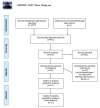Use of Mobile Phone App Interventions to Promote Weight Loss: Meta-Analysis
- PMID: 32706724
- PMCID: PMC7407260
- DOI: 10.2196/17039
Use of Mobile Phone App Interventions to Promote Weight Loss: Meta-Analysis
Abstract
Background: Obesity and lack of physical activity are major health risk factors for many life-threatening diseases, such as cardiovascular diseases, type 2 diabetes, and cancer. The use of mobile app interventions to promote weight loss and boost physical activity among children and adults is fascinating owing to the demand for cutting-edge and more efficient interventions. Previously published studies have examined different types of technology-based interventions and their impact on weight loss and increase in physical activity, but evidence regarding the impact of only a mobile phone app on weight loss and increase in physical activity is still lacking.
Objective: The main objective of this study was to assess the efficacy of a mobile phone app intervention for reducing body weight and increasing physical activity among children and adults.
Methods: PubMed, Google Scholar, Scopus, EMBASE, and the Web of Science electronic databases were searched for studies published between January 1, 2000, and April 30, 2019, without language restrictions. Two experts independently screened all the titles and abstracts to find the most appropriate studies. To be included, studies had to be either a randomized controlled trial or a case-control study that assessed a mobile phone app intervention with body weight loss and physical activity outcomes. The Cochrane Collaboration Risk of Bias tool was used to examine the risk of publication bias.
Results: A total of 12 studies involving a mobile phone app intervention were included in this meta-analysis. Compared with the control group, the use of a mobile phone app was associated with significant changes in body weight (-1.07 kg, 95% CI -1.92 to -0.21, P=.01) and body mass index (-0.45 kg/m2, 95% CI -0.78 to -0.12, P=.008). Moreover, a nonsignificant increase in physical activity was observed (0.17, 95% CI -2.21 to 2.55, P=.88).
Conclusions: The findings of this study demonstrate the promising and emerging efficacy of using mobile phone app interventions for weight loss. Future studies are needed to explore the long-term efficacy of mobile app interventions in larger samples.
Keywords: mHealth; mobile app; obesity; physical activity; weight gain prevention.
©Md.Mohaimenul Islam, Tahmina Nasrin Poly, Bruno Andres Walther, Yu-Chuan (Jack) Li. Originally published in JMIR mHealth and uHealth (http://mhealth.jmir.org), 22.07.2020.
Conflict of interest statement
Conflicts of Interest: None declared.
Figures






References
-
- MacLean PS, Wing RR, Davidson T, Epstein L, Goodpaster B, Hall KD, Levin BE, Perri MG, Rolls BJ, Rosenbaum M, Rothman AJ, Ryan D. NIH working group report: Innovative research to improve maintenance of weight loss. Obesity (Silver Spring) 2015 Jan;23(1):7–15. doi: 10.1002/oby.20967. doi: 10.1002/oby.20967. - DOI - DOI - PMC - PubMed
-
- Franz MJ, Boucher JL, Rutten-Ramos S, VanWormer JJ. Lifestyle weight-loss intervention outcomes in overweight and obese adults with type 2 diabetes: a systematic review and meta-analysis of randomized clinical trials. J Acad Nutr Diet. 2015 Sep;115(9):1447–63. doi: 10.1016/j.jand.2015.02.031. - DOI - PubMed
-
- Dombrowski SU, Knittle K, Avenell A, Araújo-Soares V, Sniehotta FF. Long term maintenance of weight loss with non-surgical interventions in obese adults: systematic review and meta-analyses of randomised controlled trials. BMJ. 2014 May 14;348:g2646. doi: 10.1136/bmj.g2646. http://www.bmj.com/cgi/pmidlookup?view=long&pmid=25134100 - DOI - PMC - PubMed
Publication types
MeSH terms
LinkOut - more resources
Full Text Sources
Miscellaneous

